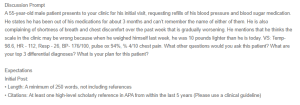Discussion – Acute Adult Illness
Patient Case Summary
The case involves a 55-year-old male patient who has not been seen for the past three months and comes to the clinic to renew his BP and DM medications, done three months ago. He complains about shortness of breath and chest pain—these symptoms have worsened over the last week; he has also gained 10 pounds in a week. His vital signs are concerning: a burning sensation in the throat; temperature 6°F, pulse 112 beats/min, respiratory 26 breaths/min; blood pressure 176/100; and SpO2 94%. He describes his chest pain as mild but rubs his chest and says it feels like a four on the pain scale.
Questions to Ask the Patient
- Could you describe the nature of your chest pain? Is it sharp, dull, crushing, or burning?
- Does the chest pain radiate to other areas, such as the jaw, arm, or back?
- Have you experienced any additional symptoms, such as nausea, sweating, or lightheadedness?
- Could you provide more details on your shortness of breath? Is it constant, or does it occur with exertion or when lying down?
- Do you have a history of heart disease, diabetes, or other chronic conditions?
Top Three Differential Diagnoses
Congestive Heart Failure (CHF)
Symptoms include shortness of breath, chest discomfort, weight gain, and elevated blood pressure.
Acute Coronary Syndrome (ACS)
Chest pain and significant cardiovascular risk factors suggest myocardial infarction.
Uncontrolled Hypertension with Potential Hypertensive Emergency:
Elevated blood pressure, chest pain, and shortness of breath indicate a hypertensive emergency (Malik et al., 2020).
Management Plan for the Patient
Immediate Diagnostics
The first appropriate investigation that should be done for this patient is an ECG to check for ischemic changes suggestive of ACS. It is possible to evaluate the patient for signs of heart failure or other conditions of the respiratory system, such as changes in the chest in the form of an X-ray (Friedman et al., 2020). Other laboratory investigations include cardiac troponins to look for signs of myocardial infarction, B-type natriuretic peptides for heart failure, and CMP for checking kidney function and electrolyte balance. Also, an echocardiography examination should be performed to determine the heart’s needs and exclude the presence of any congenital defects.
Symptomatic Relief
For symptomatic management, the patient should be given oxygen to increase the oxygen saturation by more than 94%. To manage symptoms, an IV is required that consists of potential medications like diuretics in case of heart failure or antihypertensive drugs in case of hypertensive crisis. Supraventricular arrhythmias and any acute changes in the patient’s status, as noted by Bergmark et al. (2022), require cardiac monitoring to be implemented continuously.
References
Bergmark, B. A., Mathenge, N., Merlini, P. A., Lawrence-Wright, M. B., & Giugliano, R. P. (2022). Acute coronary syndromes. The Lancet, 399(10332), 1347–1358. https://doi.org/10.1016/S0140-6736(21)02391-6
Friedman, E. R., Gatz, J. D., Dezman, Z. D. W., & Bontempo, L. J. (2020). 55-year-old male with exertional dyspnea. Clinical Practice and Cases in Emergency Medicine, 4(2), 111–115. https://doi.org/10.5811/cpcem.2020.3.46393
Malik, A., Brito, D., & Chhabra, L. (2020). Congestive heart failure (CHF). PubMed; StatPearls Publishing. https://pubmed.ncbi.nlm.nih.gov/28613623/
ORDER A PLAGIARISM-FREE PAPER HERE
We’ll write everything from scratch
Question
Discussion Prompt

Discussion – Acute Adult Illness
A 55-year-old male patient presents to your clinic for his initial visit, requesting refills of his blood pressure and blood sugar medication. He states he has been out of his medications for about 3 months and can’t remember the name of either of them. He is also complaining of shortness of breath and chest discomfort over the past week that is gradually worsening. He mentions that he thinks the scale in the clinic may be wrong because when he weighed himself last week, he was 10 pounds lighter than he is today. VS: Temp- 98.6, HR – 112, Resp – 26, BP- 176/100, pulse ox 94%, ℅ 4/10 chest pain. What other questions would you ask this patient? What are your top 3 differential diagnoses? What is your plan for this patient?
Expectations
Initial Post:
• Length: A minimum of 250 words, not including references
• Citations: At least one high-level scholarly reference in APA from within the last 5 years (Please use a clinical guideline)

